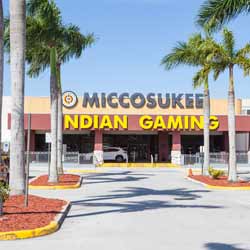Indian Gaming Casino Jobs
With Native American reservations in the United States viewed as sovereign nations, tribal leaders face the same responsibilities as any other government leaders to provide for their people and secure financing to pay for law enforcement, social services, and road work.

So far the most successful method of raising finances for tribal communities has come through gaming profits. The word “Indian” applies to tribal gaming done on Native American reservations, a component of the legal wording on all documents addressing the subject. “Indian gaming” is the accepted term for publications reporting on it and by the tribes themselves. We recognize the fact that there are hundreds of Native American nations or tribes in the United States, with Native American the preferred generic name.
In no way is the term “Indian gaming” intended as a derogatory or otherwise unfavorable portrayal of the first inhabitants of America.
Legalized gambling on Native American reservations isn’t a new concept, but it has become more refined in recent years. Its roots date back to a 1976 landmark case in which the U.S. Supreme Court ruled that states do not have regulatory jurisdiction over Native American tribes. Subsequent lawsuits further addressed the ruling, adding that states could not prohibit tribes from engaging in gaming activities. In 1988 the Indian Gaming Regulatory Act was signed into law, permitting legalized gambling for profit by Native American tribes on what are recognized as their self-governing lands. Moreover, it gives Native Americans the right to regulate all gaming activities in conjunction with the National Indian Gaming Association and for the state governments to act “in good faith” to assure that the interests of the tribal community are met. The Act also created three legally defined classes of Indian gaming, although they are subject to slight modifications as each tribe and each state government work out their respective “compacts” or agreements.
For the most part, the classes follow these guidelines: Native American tribes engaging in Class I gaming conduct social games for prizes of minimal value. This type of gaming does not involve games of chance and is not significant to the casino industry at large. Class II gaming does include games of chance, but limits them to bingo, pull tabs, punch boards, and lotteries. No card games, specialty table games, or slot machines of any kind are allowed under Class II gaming provisions.
Class III involves all manner of gaming, including horse and dog racing, casino games, and slot machines. It is under this type of gaming that the big tribal-owned casinos have opened and flourished.
While all classes of gaming activities on Native American reservations are subject to tribal regulatory decisions, Class III activities must also be approved by the chairperson of the National Indian Gaming Commission and require that ordinances be set to deal with alcohol licensing, background investigations of employees, taxation, and specific gaming regulations. These ordinances vary from state to state and from tribe to tribe. As such, Indian gaming casinos – while successful for the most part – do suffer from regulatory inconsistencies and the public’s perception that they are not run as efficiently as casinos off reservation lands.
Many in the industry are pushing for tribes to adopt more stringent regulations that would help curb such potential criminal activities as profit skimming, money laundering, and fraud – things that all casinos big and small must fight to prevent.
Indian gambling across the U.S. pulls in over $30 billion. This is more than double the take for all Nevada casinos combined. For many years, Indian casinos experienced double-digit growth rates but that slowed significantly due to the economic downturn.
As a relatively young business, Indian gaming will no doubt continue to experience growing pains. But the overall picture looks very good, and as an aspiring casino worker, you may want to investigate employment opportunities with some of the larger Indian gaming casinos springing up around the country.


 Teach English in Asia
Teach English in Asia  Cruise Ship Jobs
Cruise Ship Jobs  Alaska Fishing Industry Jobs
Alaska Fishing Industry Jobs  Sharing Economy / Gig Economy
Sharing Economy / Gig Economy